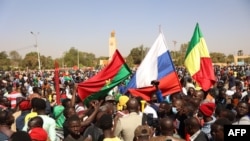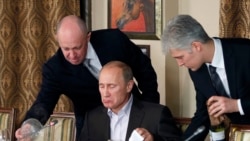On January 25, Yevgeny Prigozhin, a Russian businessman and founder of Concord Management and Consulting, praised the military coup that took place in Burkina Faso two days earlier.
In a press release that Concord posted to the Russian social media network Vkontakte, Prigozhin described the coup leader, Lt. Col. Paul-Henri Sandaogo Damiba, as just the latest rising leader in Africa, the contnent he asserted is going through a “process of renewal.”
Prigozhin also praised other coup leaders: Central African Republic (CAR) President Faustin-Archange Touadera; Col. Assimi Goita, who heads Mali’s military junta; and Col. Mamady Doumbouya, Guinea’s interim president.
The military coup in Burkina Faso was the fourth in central and west Africa in just one year. A coup in Chad in April 2021 was the first, followed by Mali in May 2021, Guinea in September 2021, and finally Burkina Faso.
Describing these military takeovers as “so-called coups,” Prigozhin said they had occurred because the West is trying to “keep the populations of these countries in a half-animal state,” “impose values alien to Africans,” and “sometimes clearly mocking them.”
“In Africa, we are witnessing the birth of a new liberation movement,” Prigozhin said.
That is false.
The regime changes in all four countries happened in a text-book military coup manner, not through a popular uprising or a democratic process.
The motivations for leadership changes in these countries vary, though chronic security threats from Islamic jihadists is a common factor, as are economic and internal politics.
What has been “liberated” are possible business opportunities for Prigozhin, whose network of interconnected companies is widely reported to include Russian mercenary troops under the umbrella of the so-called Wagner Group. We say so-called because Wagner is the generic name for what United Nations investigators describe as related Russian private military entities.
Prigozhin, it should be noted, has denied any connection to the Wagner Group.
In fact, in one statement, he suggested that the group does not exist, telling The Bell newsletter in January 2019: “In the Ministry of Defense, with which I have no ties, I can’t hold talks about financing or equipping a PMC which doesn’t exist.”
The working group on mercenaries set up by Office of the United Nations High Commissioner for Human Rights (OHCHR) said in a report released last year:
“[A] Russian-based organization popularly known as the Wagner Group … does not seem to have a legal existence, while operating in several countries around the globe. This web of enterprises shares, to different degrees, management and ownership structures, as well as personnel, and identifiers such as phone numbers, addresses and emails.”
Prigozhin is a Kremlin-linked oligarch and a former convict who made his wealth from catering and restaurant businesses he ran in the 1990s. It is believed that Prigozhin met Putin when the latter was as an official in the St. Petersburg mayor’s office, serving as, among other things, chairman of the city’s supervisory board for casinos and gambling. In 1996, Prigozhin opened a restaurant called "Old Customs" that became a favorite dining destination for the St. Petersburg mayor and his right hand, Vladimir Putin.
Prigozhin later opened a chain of restaurants in S. Petersburg and Moscow where Putin liked to dine.He later became to be known as “Putin’s Chef” after the Kremlin granted a long-term catering contract to his company.
Prigozhin’s connection to Putin made it possible for him to secure lucrative deals with the Russian Defense Ministry, the New York Times reported.
The United States, United Kingdom and European Union imposed sanctions on Prigozhin for alleged interference in the 2016 U.S. presidential and 2018 U.S. midterm elections. That is because Prigozhin is also said to control Internet Research Agency (IRA), a St. Petersburg-based firm involved in propaganda and disinformation campaigns as well as hacking.
The OHCHR’s working group on mercenaries and other sources say Wagner mercenaries and trainers have been active in conflict zones and receive support from the Russian state.
The U.S. government labels the Wagner Group a proxy for Russia’s Defense Ministry, and the group’s personnel reportedly even train at a camp shared by Russian special forces in Molkino in southern Russia, Foreign Policy magazine reported.
In September 2020, the Center for Strategic and International Studies, a Washington D.C.-based think tank, said Wagner used the Russian Defense Ministry’s transport infrastructure to fly its operatives to various countries, including Libya and Syria.
Foreign Policy highlighted that private military companies are illegal in Russia, meaning the Kremlin could crack down on Wagner if it wanted to. The fact that such companies are illegal “also creates an accountability vacuum for victims of atrocities allegedly carried out by the network’s operatives,” the magazine wrote.
The U.S. and European Union sanctioned Wagner for destabilizing activities in the countries where it operates and for alleged human rights abuses in CAR, Ukraine, Syria and Libya.
In June 2019, Britain’s Guardian newspaper published leaked documents obtained by the Dossier Center, a U.K.-based investigative unit. They showed that the Wagner Group was trying to extend its activities into 13 African countries, and that Prigozhin himself was leading the effort to fulfill Moscow’s ambitions to turn Africa into a strategic hub.
The leaked documents also showed that Russia hoped to eliminate “pro-Western” uprisings and force the United States, Britain and France out of the region. The strategy was to strengthen ties with existing African leaders, make arms deals and groom new, pro-Russian leaders.
“One working paper is titled ‘African world’,” the Guardian reported. “It calls for a developing ‘African self-identity’. It recommends collecting a database of Africans living in the U.S. and Europe, which might be used to groom ‘future leaders’ and ‘agents of influence’. The eventual goal is a ‘loyal chain of representatives across African territory’, the March 2018 paper says.”
Prigozhin’s strategy included using social networks to shape African opinion, the BBC reported in November 2019. One month before the BBC published its report, Metaverse, previously Facebook, said it had acted against Russia-connected accounts in several African countries.
“We removed three networks of accounts, Pages and Groups for engaging in foreign interference — which is coordinated inauthentic behavior on behalf of a foreign actor — on Facebook and Instagram. They originated in Russia and targeted Madagascar, Central African Republic, Mozambique, Democratic Republic of the Congo, Cote d’Ivoire, Cameroon, Sudan and Libya,” Facebook said in a statement.
Prigozhin denied any links to the networks of accounts and accused Meta of "indulging in PR for itself."
A 2019 investigation by CNN said that Prigozhin was sponsoring Moscow’s expansion into Africa. The investigation found that Prigozhin’s operations included a mining company called Lobaye Invest, which was funding a radio station in CAR and the training of local soldiers by some 250 Russian mercenaries.
“Prigozhin provides the mercenaries and funding to deepen Russia’s presence and in return wins access to unexploited riches,” CNN reported.
Valery Zakharov, a former Russian military intelligence officer who was working as a security adviser to CAR’s President Touadera, denied any links to Prigozhin and said he was receiving his salary from the CAR president. But CNN said it had obtained documents showing that Zakharov was paid at least once in 2018 by a Prigozhin company, M-Finans.
In March 2021, The Africa Report said Zakharov’s activities included negotiating with rebels in Sudan, and that he was reportedly behind the creation of Lobaye Invest and Sewa Securite, another alleged Wagner affiliate.
Lobaye Invest, whose managing director, Evgenii Khodotov, is also linked to Prigozhin, was able to secure mining reconnaissance permits to identify possible gold and diamond deposits in CAR, the The Africa Report said.
In September 2021, Foreign Policy wrote that Russia’s strategy was to target weak states and pick them off one by one, and that the Wagner Group gave Moscow vast influence in the African continent.
The Daily Beast reported that the coup leader in Burkina Faso, Paul-Henri Sandaogo Damiba, has been trying to convince the toppled president, Roch Kabore, to hire the Wagner Group to fight jihadists. Damiba was recently promoted to oversee security in the capital Ouagadougou.
The report said Damiba had ties with coup leaders in both Mali and Guinea.
“Damiba is said to have spent time with Goita and Doumbouya in 2019, when both men participated in a U.S.-led military exercise known as Flintlock in Burkina Faso, and has remained close to them since then,” the Daily Beast reported.
The Daily Beast reported in September 2021 that two of Mali’s coup leaders had received training in Russia for almost a year before they returned to Mali a few days before the coup. The Daily Beast added that Malian Army Cols. Malick Diaw and Sadio Camara were suspected of contacting other officers involved in the coup while they were still in Russia.
According to the Daily Beast, a colonel, who was one of five soldiers that announced the coup from state broadcaster ORTM, had been the “head of a special military unit based in central Mali and had taken part in the annual Flintlock training put together by the U.S. military to help countries in the Sahel region better tackle militants.”






